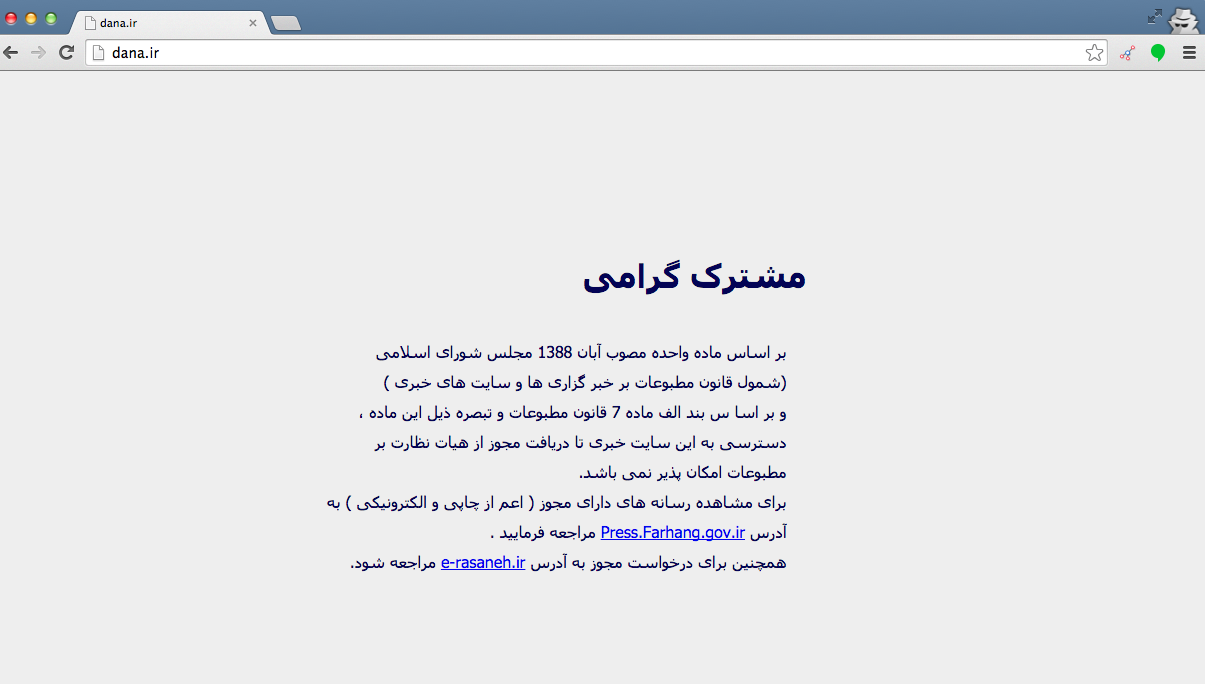Under recent changes to the Iranian government's already-stringent media regulatory regime, all online newspapers are now required to register with the Ministry of Culture and Islamic Guidance through a site called “e-rasaneh” (“e-newspaper” in Farsi), which falls under the jurisdiction of the nation's Press Supervisory Board.
Websites that cooperate with the new regulations will receive six-month subsidies from the Ministry, along with press passes for national events.
State news agency IRNA reported the news after a press conference with Deputy Minister Hossein Entezami in late August. Entezami asked Iran media industry leaders to cooperate with the new measures, “so the legal environment can fall in line with the nation's press.”
“All news and news sites have been notified that based on Article 18 of the press law, which is based on legal matter, they will now be responsible for providing the name and address of the owner, and the director of the media office [to the Ministry of Culture and Islamic Guidance],” he said.
Iran's Article 18 is part of the nation's Press Law, which states “each issue of a publication should bear the name of the license holder, managing director, office address and the address of the printing house where the publication is printed.”*
Entezami noted that Iran's Internet boasts a large number of unlicensed news websites, and the Press Supervisory Board would soon begin to block them without discrimination. The Ministry has not yet defined exactly what constitutes a news website. However, Entezami did notify the press conference that Iranians would soon be able to report any news website lacking proper licensing through a online platform run by the supervisory board. Entezami also noted that websites cooperating can expect to receive their government-issued payments at the end of the Persian calendar month of Shahrivar.
This past week, dana.ir was one of the first websites Iranian users found to be blocked under the new legislation.

Dear user, Based on the article approved on November 2009 in Parliament (including the law on press, broadcasts and news sites) and by article 7, paragraph (a) on press laws, access to this website due to a lack of license from the Press Supervisory Committee is not possible. To view the licensed media (both in print and digital) visit press.Farhang.gov.ir. To apply for permission to host your website visit e-rasaneh.ir.
These new regulations, and posturing towards more filtering comes alongside President Hassan Rouhani's often liberal-minded statements against filtering and forced regulations. The tweet below, from the President's official account, quotes a televised speech he delivered this past Sunday:
If you set up #filter, somebody'll set up anti-filter. Nothing'll be resolved in this way – if it did, issues would've been resolved by now.
— Hassan Rouhani (@HassanRouhani) September 7, 2014
For many Iranian Internet users, the combination of these regulations with the recent uptick in arrests of online activists and bloggers make it difficult to take Rouhani at his word.




1 comment